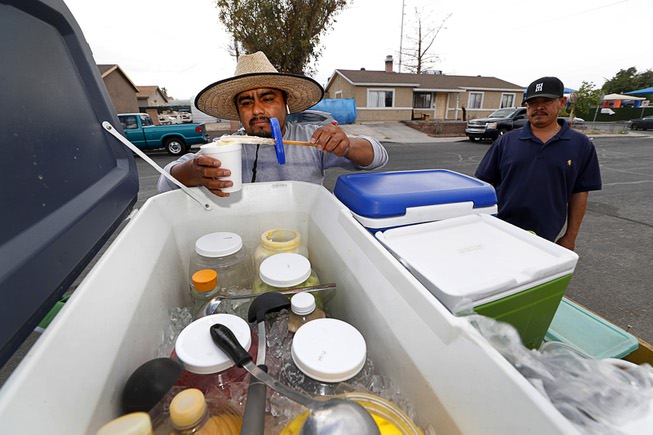
Street vendor Luis Sanchez prepares an elote (corn on the cob with butter, mayonnaise and garnished with cheese) in a cup for customer Miguel Rodriguez in a residential neighborhood in North Las Vegas Wednesday, June 14, 2023. Senate Bill 92, signed by Governor Lombardo last week, legitimizes street vendors across the state, providing them with the necessary permits to operate and grow their small businesses.
Published Tuesday, Oct. 3, 2023 | 2 a.m.
Updated Tuesday, Oct. 3, 2023 | 12:27 p.m.
Update: The Clark County Commission today unanimously voted in favor of passing an ordinance to regulate street vending.
The Clark County Commission today will consider an ordinance establishing guidelines for street vendors to become licensed, setting up protocols required in a new state law to regulate the industry and give protections to workers.
Local ordinances must be passed before Oct. 15, when the state legislation goes into effect.
“We have to start somewhere because we can’t have a free-for-all. We’ve got to make sure that we do it right, especially if you want to grow it over time,” Commissioner Marilyn Kirkpatrick said of the ordinances at a Sept. 12 town hall on the issue.
Counties that do not adopt ordinances to comply with the legislation, Senate Bill 92, cannot cite, fine or prosecute a sidewalk vendor for a violation, according to the new law, signed this summer by Gov. Joe Lombardo.
The proposed county ordinance describes sidewalk vendors as “a person who sells food, beverages or merchandise upon a public sidewalk or pedestrian path from a conveyance, including, without limitation, a pushcart, stand, display, pedal-driven cart, wagon, showcase or rack.”
The county’s proposal prohibits vendors from selling within 1,500 feet of a resort or event facility with seating capacity of at least 20,000, such as Allegiant Stadium and T-Mobile Arena. The state legislation, sponsored by Sen. Fabian Doñate, D-Las Vegas, established the 1,500-foot minimum distance.
Vending near convention facilities operated by the Las Vegas Convention and Visitors Authority and on highway medians adjacent to parking lots is also prohibited.
The rules will not apply to areas zoned for residential use, except on a public sidewalk or pedestrian path immediately adjacent to one of the other locations listed.
Private sidewalks can be governed by the owner, who can decide whether to allow a vendor to operate, according to the proposed ordinance.
Those in violation of the ordinance can be charged with a misdemeanor punishable by up to six months in jail and a fine of up to $500.
Ultimately, vendors will need three permits and licenses to operate in unincorporated Clark County: a state business license from the Nevada secretary of state; a permit from the Southern Nevada Health District; and a business license from Clark County.
Sidewalk vendors won’t have to provide their Social Security number or immigration status to obtain a license, said Vincent Queano, director of the county’s business licensure department.
The Southern Nevada Health District will also have to adopt health-related regulations by the end of 2025 for sidewalk vendors selling food items, said Chris Saxton, director of environmental health at the Heath District.
There are standards already in place, including vendors not selling food prepared from home kitchens.
The health district also requires vendors to have ingredients that are bought and prepared on the same day at the sidewalk location or ingredients that are stored then prepared at a permitted permanent location — one that would need to be inspected by the health district.
Additionally, stands and bikes must have certain features, like a hand-washing station and waste retention tanks, that comply with the health district’s rules on food handling and safety.
The vendor is responsible for paying all their fees related to licensing and permits.
Health district officials estimate that vendors will have to pay over $800 for a health plan review and permit during the first year, then $376 for the permit in following years, Queano said. There would also be a $200 fee for a state business license, Kirkpatrick said.
The county will have until July 1, 2024, to pass a second ordinance placing additional regulations on street vendors, county officials said. New rules may come as early as January 2024, and “will establish the licensing and regulations to support sidewalk vendors,” Queano said.
Requirements targeted in the second ordinance could include: Restrictions on hours of operation and selling within a set distance from establishments such as pedestrian malls, licensed food establishments, county-owned parks or schools.
